- Home
- Farley Mowat
The Dog Who Wouldn't Be Page 14
The Dog Who Wouldn't Be Read online
Page 14
The garageman’s face indicated that at least he found it so. The tempo of his jaw speeded up and his face registered a look of fearful, and then desperate, incomprehension.
Perhaps Mutt was as curious as were the rest of us, for at this moment he chose to thrust his goggled head over the edge of the car for a closer look, peering in his shortsighted manner into the garageman’s face.
The man had had enough. He moaned low in his throat, threw the tire iron recklessly over his shoulder, but did not stay to hear the crash of broken glass as the sole window shattered. He was gone by then, running down the muddy street, his lank arms held high above his head and the rain beating into his face.
“Oh, Jesu!” he was crying. “Oh, Sweet Jesu! I never done it, that I’ll swear!”
Mother was shocked. She felt that this was a foolish and sacrilegious thing to say. But how could she know? I have often speculated since on the nature of that man’s hidden crime, for there must have been small enough scope for sin in that desolate and meager little village.
More than a year elapsed, and Wol had become a full-fledged member of the family, before he struck once more at human sanity. He had, by this time, become a house owl, making almost as much use of the house as we did ourselves. It was useless to try to deny him house privileges, for he had learned that when he came and banged on the window panes with his horny beak, we would hasten to admit him before the glass gave way. During the warm seasons we resigned ourselves to leaving one of the living-room windows permanently open, and by this portal he would come and go as the mood was on him.
In the summer of Wol’s second year, Saskatoon was enriched by the arrival of a young curate who had just graduated from a divinity school in the east. The curate was of an earnest persuasion and he made it his first duty to pay a call on every one of the members of our parish (to which he was attached). It was a warm and balmy summer afternoon when he reached our house.
He rang our doorbell, and Mother was pleased to welcome him, for he was a well-favored youth. He had the high-domed forehead that is so often the mark of the stage cleric, but the hair above it was black and curly. Mother invited him into the living room for a chat and a cup of tea.
The young man made himself discreetly comfortable on our chesterfield, a massive and antique piece of furniture which was so placed that it faced the fireplace, with its back to the open window some six feet behind it. Balancing a cup gracefully in his hand, the young divine engaged Mother in conversation, the burden of which was concerned with my own lamentable absences from Sunday School.
Wol had been spending that afternoon ant bathing. This was a peculiar pastime in which he sometimes engaged, and which consisted of tearing an anthill apart and then fluffing the mixture of dust and angry ants through his feathers. He appeared to find the sensation gratifying, although its purpose seemed inscrutable to us. At any rate, he finished his bath about 4 P.M. and, feeling in an amiable mood, decided to come into the house and tell Mother about it.
To this day my mother swears she did not see him in sufficient time to warn her visitor. I believe that she saw him well enough, but was just too petrified to open her mouth.
Now Wol, in his maturity, had become a sentimental bird, possessed of the habit of leaping lightly to one’s shoulder, there to balance himself while he tenderly nibbled the nearest human ear with his great beak, breathing harshly but affectionately into the face of his companion the while. Everyone who was acquainted with Wol knew of this habit, and some deplored it, for Wol was a carnivore and as a result he had the most atrocious breath.
The flight of an owl is noiseless; there is no warning rustle of pinions. Wol’s arrival on the windowsill was as silent as the arrival of a puff of thistledown. He paused a moment in the opening and then, spying a pair of tempting shoulders on the chesterfield, launched himself across the narrow intervening space.
The object of his attentions shot straightway into the air and began leaping ecstatically about the room. It was an ill-considered action on his part, for Wol lost his balance and, with a purely involuntary reflex action, tightened up his talons.
The curate now demonstrated that he was both an athletic and a vocal youth. He howled, and his bouncing became wilder. Wol, clinging for dear life now, and deeply disturbed by his reception, tightened up his grip once more and then – and it could have happened only as a result of his surprise and indignation – he forgot for the first and last time in his mature life that he was housebroken….
I do not recall any single catastrophe among the many which beset my family through the years that caused us quite as much embarrassment as this one did. Mother, who was a pillar of the church, suffered more than the rest of us, but my father and I were not exempt. I can but hope that the church officials noticed how well filled the Mowat collection envelopes were on succeeding Sundays. I hope too that the elders of the church had the common decency to reimburse their new curate for dry-cleaning expenses incurred, let us say, in the line of duty.
The stories of my family and Wol and Weeps that I have so far related are only high lights of a relationship which, on the whole, was a warm and rewarding one. Even my mother, who had less reason than any of us for such an attitude, was fond of Wol and she forgave him almost everything during the three years he was with us. Though our owls were often underfoot, both actually and figuratively, we would not willingly have eschewed the chance to live with them.
But as it must be with the lives of most wild things which have been taken from the wilderness, the final fate of the two owls was a tragic one. When we left the west permanently in 1935, it proved impossible to take them with us; and so we reluctantly made arrangements with an acquaintance who owned a farm some two hundred miles from Saskatoon to care for our old friends. It was, of course, out of the question to turn them loose, for they would have been as helpless in the outer world as newborn owlets.
For almost a year we had good reports of both our birds; but then poor ineffectual Weeps somehow managed to strangle himself in the wire netting of his cage. Only a few weeks later Wol tore the mesh apart and vanished.
I wish that he had vanished permanently.
Before we left the west I tagged both owls with aluminum bands supplied by the U. S. Biological Survey. One day I received a letter from the survey informing me that a great horned owl, banded by me in Saskatoon in the spring of the year 1935, had been shot and killed in that same city in April of 1939.
The address of the man who killed the owl, and who returned the band to Washington, was given. It was the address of the house where we had once lived with Wol and Weeps.
So in the end Wol went back to that home which he had known so well. It took him almost three years to find his way, yet he succeeded. I can guess at his thoughts as he landed in the familiar old poplars and then dropped contentedly down to light upon the windowsill, and to rap imperatively upon the glass with his great beak….
I hope that death was mercifully quick.
14
A MESS OF SKUNKS
lmost every dog eventually runs foul of a skunk. Most dogs learn something from the experience. The wiser ones may conclude that it is common sense to defer to skunks in future, and even those tykes that habitually pursue danger tend to be more circumspect after their first encounter.
Mutt was no fool. Neither was he feckless. And this makes it even more difficult to explain his inability to grasp the fact that mixing it with skunks was unrewarding. The only beast I know of that makes a practice of attacking skunks is the great horned owl, but it has almost no sense of smell, it does not normally live in houses, and furthermore it eats the skunks it kills. Mutt, on the other hand, could smell very well, he habitually lived in houses with other and more sensitive beings, and he did not eat raw meat.
I can find no rational explanation for his foolhardy attitude toward skunks. The fact remains that there was hardly a time after he had passed his second birthday when he was not accompanied by that familiar odor – som
etimes of great intensity, sometimes no more than a faint, but unmistakable, miasma in the air.
It is noteworthy that his first encounter was delayed until he had entered his third year.
It happened in July. In order to escape from the savage heat of the prairie summer, we had hauled the caravan north into the forested part of Saskatchewan, to a small resort on Lotus Lake. Mother’s association with the Church of England in Saskatoon had gained us the privilege of being permitted to park our caravan on an isolated beach that belonged to the church and that was normally reserved for members of the cloth and their immediate families.
It was a most pleasant site. The caravan was close to the water’s edge, on a small and private cove. There was a dock, equipped with a diving board, for our personal use. Privacy was the watchword of the place and we took advantage of it to swim without benefit of bathing suits. We were circumspect about this, for we had no wish to shock our hosts – but we were equally determined not to wear clothing in the water, unless driven to it.
We were soon driven to it. There were many young people at the beach: young divines, and young daughters of elderly divines. They were all, apparently, addicted to moonlight canoe expeditions, and our secluded cove seemed to draw them irresistibly. A canoe at night can be a stealthy thing, and much of the pleasure of our nocturnal bathing was spoiled by the irritating necessity of keeping a careful watch.
My parents felt this irritation more than did Mutt or I. Mutt had nothing to hide in any case, and I had almost as little to worry about, for I was then only twelve years old. My parents began to forgo the pleasures of the unclothed evening swim, but Mutt and I were more resolute.
Mutt was a fine swimmer, and he greatly enjoyed diving. He actually preferred to go in off the board, and it was a remarkable thing to see him bouncing slowly up and down at the end of the plank, gaining momentum for his leap.
One evening he and I left the caravan, with Mutt well in the lead. By the time I reached the shore, Mutt was halfway out the plank, and it was then too late for me to do anything but watch.
The board was already occupied. A skunk was lying at the tip of it, dreamily staring down into the moonlit waters at the schools of plump little rock bass that flickered back and forth. Innocent as he then was, Mutt nevertheless showed incredible obtuseness – the first intimation of this curious weakness that was to become so painfully familiar to us in the future. He made no effort to investigate the skunk. He simply lowered his head, flung his ears back out of his eyes, and charged.
The skunk’s defensive blast caught Mutt from a range of not more than three feet, and deflected him to one side so that he ran off into space with considerable momentum and hit the water a good distance from the dock. I think that he must have actually gone right over the canoe, for when he surfaced – screaming with pain and outrage and lashing the water blindly – it was the seaward side of the canoe that his paws encountered.
I had not been aware of the canoe until then, but neither I nor any other resident of that section of the beach was left long in ignorance of its proximity. Mutt’s efforts to scramble aboard completed the discomfiture of a young couple who had already reaped the wind. The man, who was a clergyman-to-be, showed a nobility of soul commensurate with his vocation. But the young lady was the daughter of a vicar – and she ran true to type. Her language was not churchly and, although I had spent much time among the tough boys who lived on the wrong side of the tracks in Saskatoon, I was impressed by this girl’s virtuosity.
Our annoyance with Mutt was tempered by a degree of gratitude, for during the remainder of our stay at Lotus Lake we were untroubled by young love under the moon. Our little bay had acquired a hard name locally.
We had had our period of grace; for after this first encounter, Mutt and skunks became almost inseparable. There was a brief surcease for us during the heart of winter, but with the first spring days and the emergence of the skunks from semi-hibernation, we took up our cross once more.
It seemed to make no difference where we might be, in the geographical sense. On one occasion we welcomed spring in an area where no skunk had been reported for thirty years. There were skunks that spring; so many of them that the locals marveled, and spoke in hushed voices of a visitation.
Mutt’s popularity was endangered by this affinity for skunks and there were people who may have wished in their hearts that Mutt had never been. Foremost among them must have been the undertaker’s assistant in Happy Home Cemetery on a June day in 1939.
Happy Home lies in the heart of metropolitan Toronto and is isolated from the nearest wilderness by miles of asphalt desert. Yet it is very green and, in the spring at least, lovely with bird song. It is well named, for with its trees and brooks it is an oasis in the gray desolation of the city. Almost anyone could be happy there. Certainly Mutt and I found it a happy place, for it was our retreat during the blighted year we lived in Toronto. We spent many hours in Happy Home, looking for birds or simply meandering among the willow trees. We harbored the dream that some day we should encounter another exile like ourselves – a pheasant, or perhaps a rabbit.
The June day of which I write was one of sweltering heat such as only the perspiring body of a great city can generate. Mutt and I had fled to Happy Home, where we wandered among the acres of gleaming headstones and imagined that each concealed the burrow of a gopher. We thought often of gophers and always with a sense of sad regret; and if we mentally populated Happy Home with the little rodents, we meant no disrespect.
After a time I heard the song of a yellow warbler in the trees beside an artificial pond, and I pursued it while Mutt, who was never much of a bird watcher, went snuffling off in the hope of finding a more interesting trail. Unexpectedly he found one and with a shrill yelp took up the chase. I turned in time to see his white rump wink out of sight among the trees.
“Rabbit – at last!” I thought and, not to be denied a glimpse of it, ran after Mutt.
When I emerged on the level burying ground beyond the pond, Mutt was already several hundred feet away. As usual his queer, lopsided gallop gave him the appearance of having a strong starboard drift, like a small sailing vessel with insufficient keel beating to weather against a stiff breeze. In point of fact Mutt was heading dead into the wind, and sailing fast and straight.
It was a light wind, but sufficient. It came gently over Mutt and on to me, and I halted in my tracks. I was a little bitter. I had so much wanted it to be a rabbit.
As I took in the scene ahead of me I saw a somber, penguinlike assembly in the distance. The sight of the funeral party shocked me into acute apprehension. I whistled frantically for Mutt, but he was deaf. Hot with the passions of his old madness, he loped resolutely on.
By this time he was rapidly approaching the funeral party from the rear, while the mourners remained all unaware. However, my whistle must have reached the ears of the undertaker’s assistant, for this tall young man slowly turned about. He did not see me, for I had already resigned him to his fate and had retreated into the shelter of the willows. But he saw Mutt approaching like a dog possessed.
The skunk was a small one, probably born that spring, and it must have been distrait in those unfamiliar surroundings. Trotting nervously among the stones, it veered erratically as it attempted to decide whether Mutt or the large man in the top hat was the more formidable enemy. It was inconspicuous, and I doubt if either the undertaker’s assistant or Mutt actually saw it. Mutt at least knew it was somewhere near. The assistant did not. He had begun to run toward Mutt, intending, evidently, to head him off. His mouth was working, and he looked indignant.
The three of them came together with perfect timing under the lee of a pink marble shaft.
It was a distressing incident, but not without some compensation, for it convinced my parents that the heart of a great city was not our chosen ground. It was directly responsible for my father’s decision to move us to a village some forty miles away.
This village seemed like an odd
little place to me, fresh from the untrammeled west. There was an atmosphere about it of dusty corsets, creaking whalebone, and the aggressive gentility which is assumed by so many eastern Canadian hamlets. I found myself ill at ease among the boys and girls of my own age, and I was baffled by their sober and resolute attitude of hostility. I did not understand the watchfulness of our neighbors and I could not find the means to penetrate the barrier of suspicion that surrounded us.
Our new house itself was probably much to blame for our cold reception. Its previous tenant was a sculptor, one who had little talent for his art, but who concealed this deficiency by being pugnaciously and preposterously “modernist.” The house was cluttered with his experiments and we suspected that he had sold the place as the only possible means to escape from the children of his contorted ego. Most of the pieces were passionless repetitions of a nude female torso, but many others were quite inscrutable. I recall one piece in particular. It was a wood carving that resembled nothing quite so much as a bicycle wheel that had been savaged by a determined railroad locomotive. It was called Holes in the Soul. For some reason it irritated Mutt, and when we had banished it to the back yard, he would stand and stare at it by the hour with his teeth bared slightly in a grimace of distaste.
Nevertheless, it was not the character of the vanished sculptor that had damned the house. It was simply the fact that he was an artist, and therefore in almost any part of rural Ontario he and his domicile would have been suspect. There can be few places in the world that are so resolutely determined to defend themselves against any suspicion of culture as the villages of central Ontario. They have a steadfastness that St. Ignatius Loyola himself would have admired.
We blamed the house for the frigidity of our reception. Yet, despite its lurid past, it suited us. Its front door looked out sedately over the outskirts of a sedate community; but then the house rambled backward through sagging passages until the back door opened on an unconstrained stretch of countryside. These tangled fields were a haven, not only to Mutt and me, but to many other beasts – not least of which was a family of skunks.

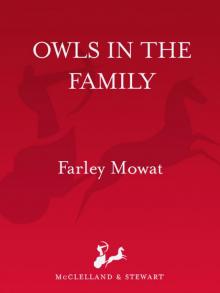 Owls in the Family
Owls in the Family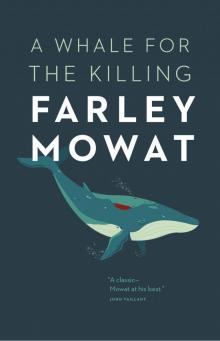 A Whale for the Killing
A Whale for the Killing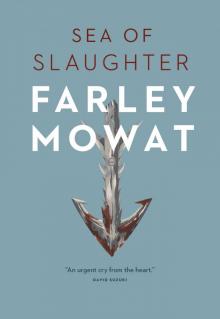 Sea of Slaughter
Sea of Slaughter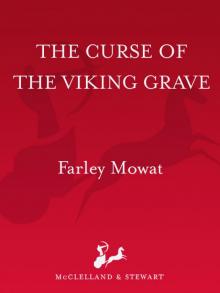 The Curse of the Viking Grave
The Curse of the Viking Grave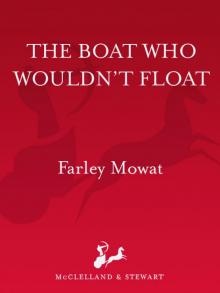 The Boat Who Wouldn't Float
The Boat Who Wouldn't Float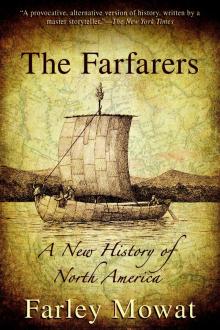 The Farfarers: Before the Norse
The Farfarers: Before the Norse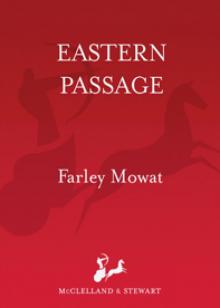 Memoir
Memoir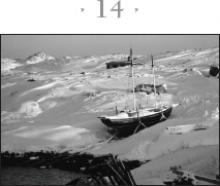 Bay of Spirits: A Love Story
Bay of Spirits: A Love Story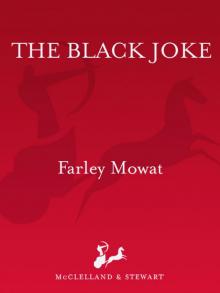 The Black Joke
The Black Joke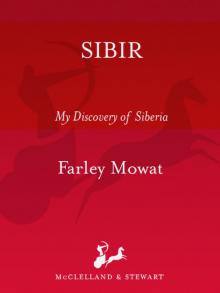 Sibir: My Discovery of Siberia
Sibir: My Discovery of Siberia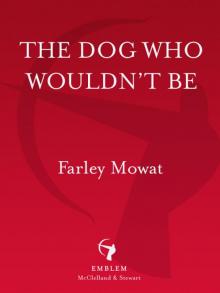 The Dog Who Wouldn't Be
The Dog Who Wouldn't Be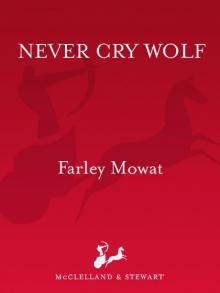 Never Cry Wolf
Never Cry Wolf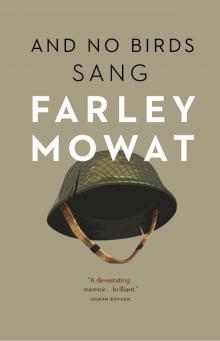 And No Birds Sang
And No Birds Sang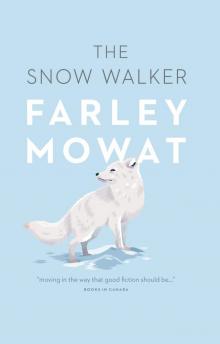 The Snow Walker
The Snow Walker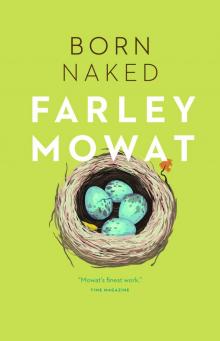 Born Naked: The Early Adventures of the Author of Never Cry Wolf
Born Naked: The Early Adventures of the Author of Never Cry Wolf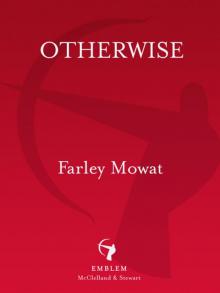 Otherwise
Otherwise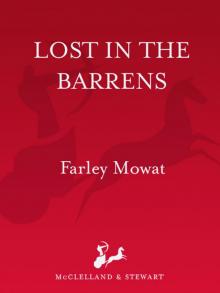 Lost in the Barrens
Lost in the Barrens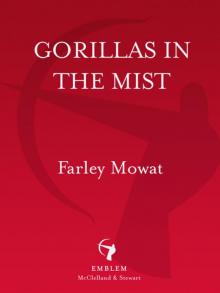 Gorillas in the Mist
Gorillas in the Mist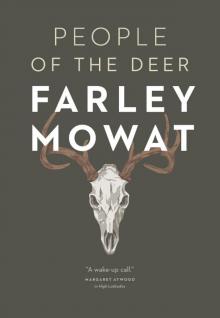 People of the Deer
People of the Deer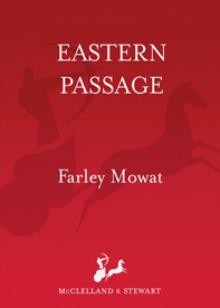 Eastern Passage
Eastern Passage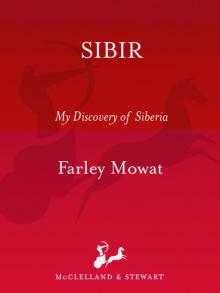 Sibir
Sibir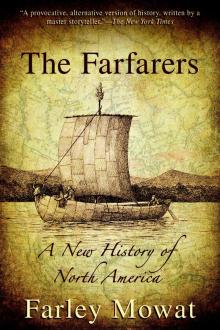 The Farfarers
The Farfarers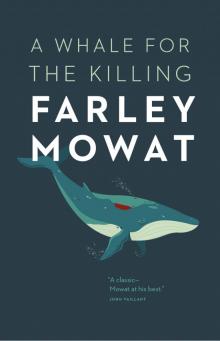 A Whale For The Killing (v5.0)
A Whale For The Killing (v5.0)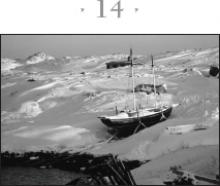 Bay of Spirits
Bay of Spirits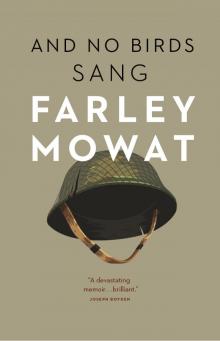 And No Birds Sang (v5.0)
And No Birds Sang (v5.0)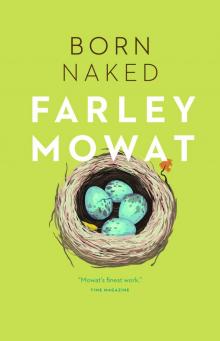 Born Naked
Born Naked